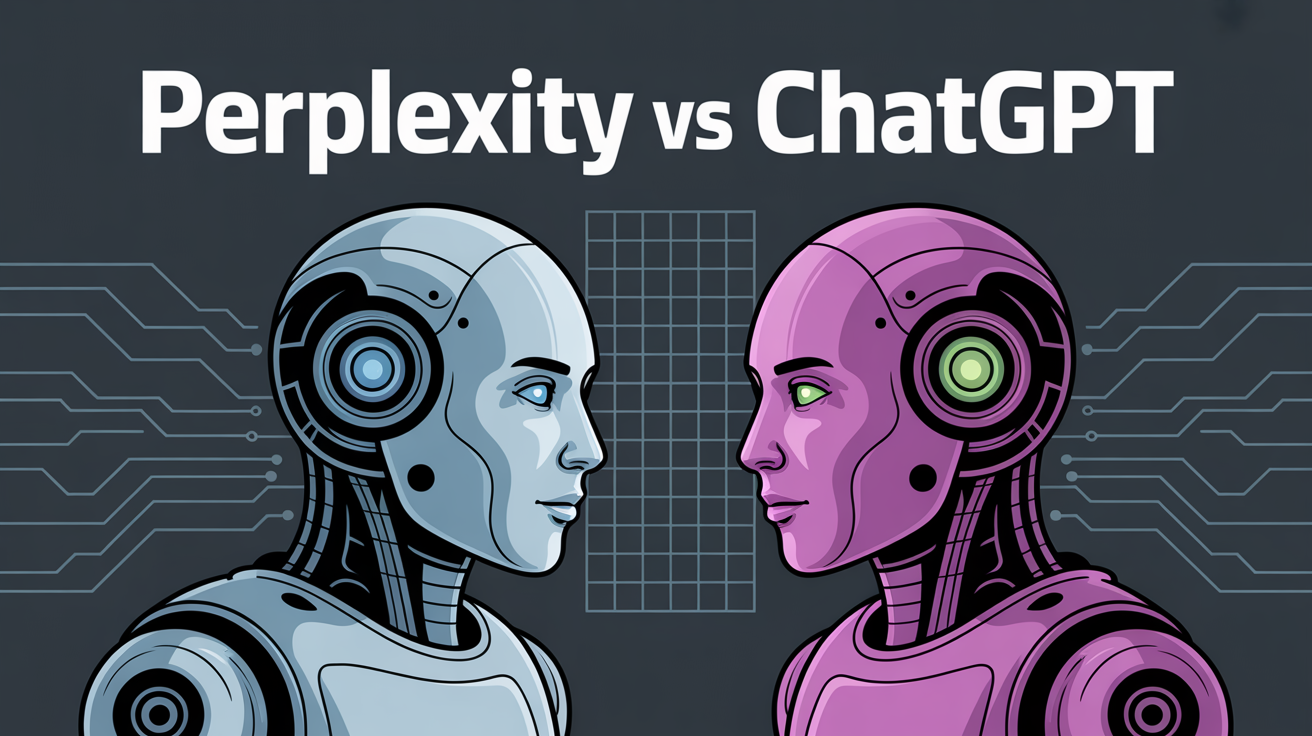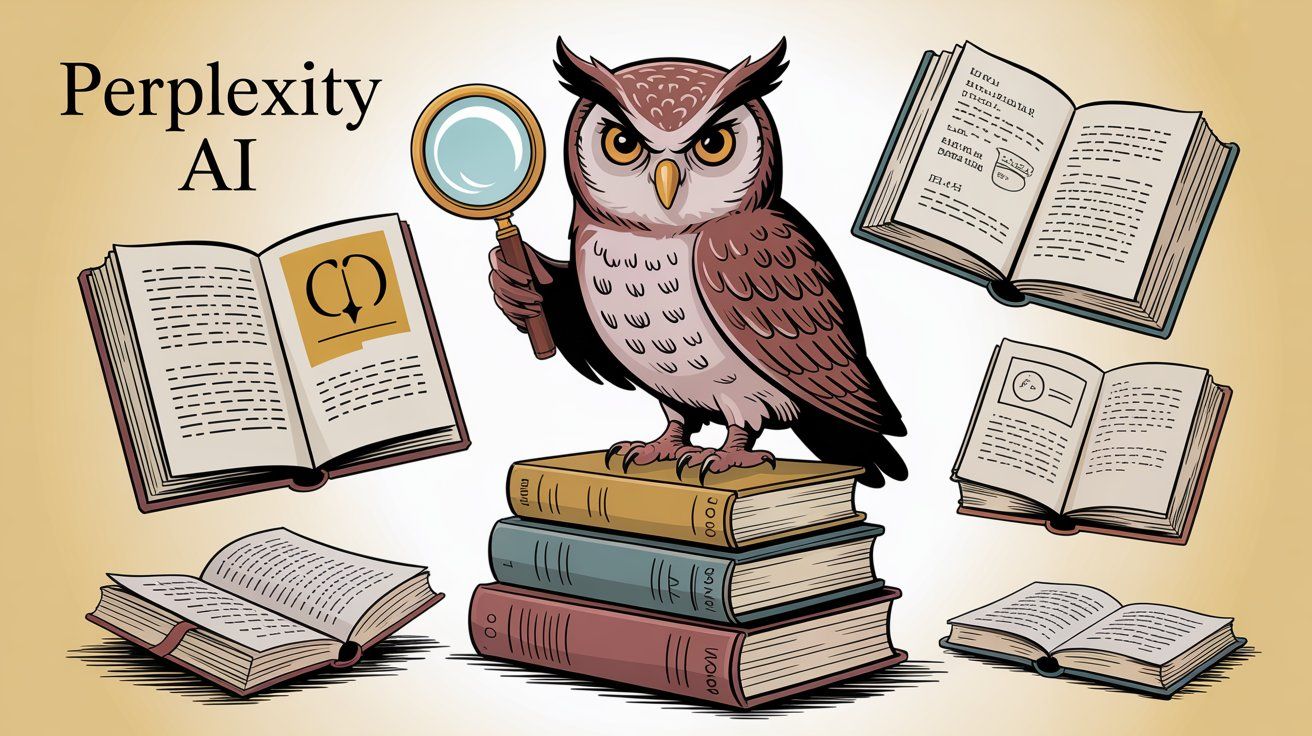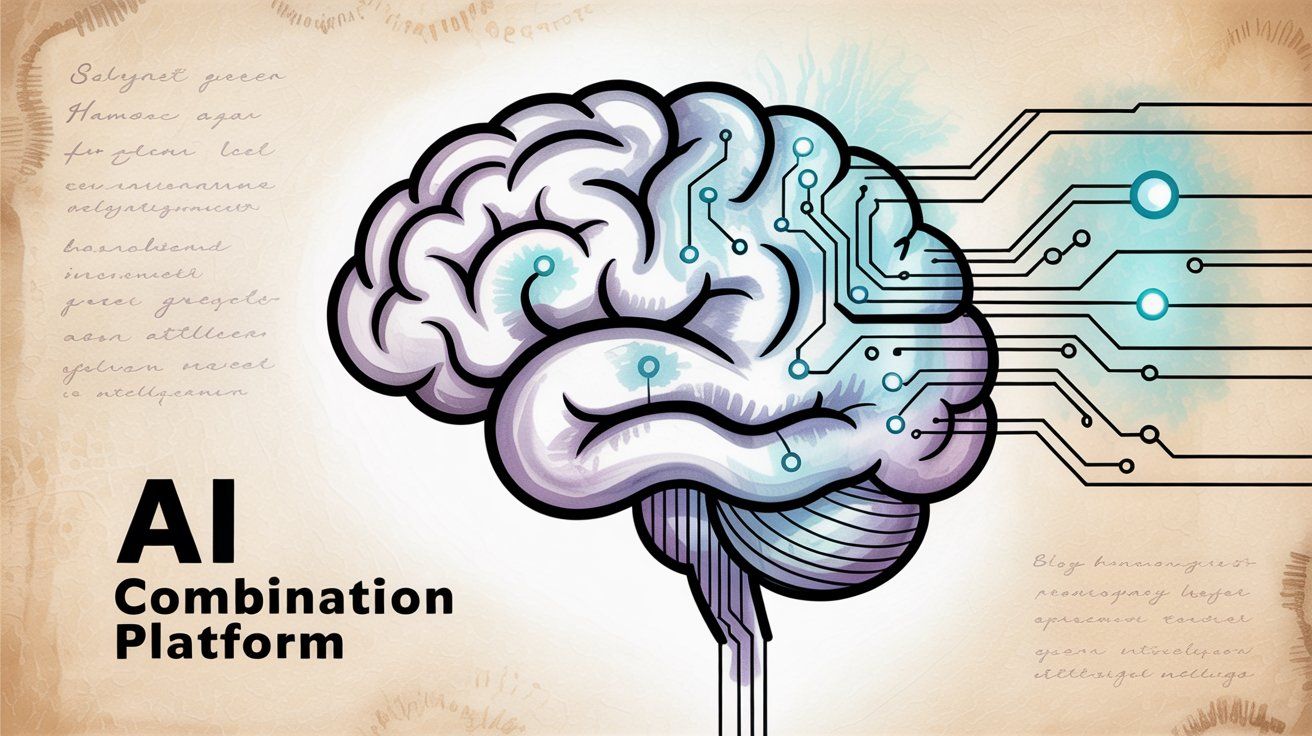
Perplexity vs ChatGPT Which AI Tool Wins? (2025)
Discuss with AI
Get instant insights and ask questions about this topic with AI assistants.
💡 Pro tip: All options include context about this blog post. Feel free to modify the prompt to ask more specific questions!
Last Updated: September 2025
Your business needs AI for customer support, content creation, and research. Two names keep coming up: ChatGPT and Perplexity AI.
The choice between these tools isn't just about features – it's about finding the right fit for your specific business needs.
ChatGPT (from OpenAI) became the fastest-growing consumer app ever, hitting 100 million users within two months. It's the versatile chatbot that can draft emails, debug code, and hold natural conversations. Learn more about ChatGPT's rise.
Perplexity AI took a different approach. It's an "AI-powered answer engine" designed specifically to fetch up-to-date information from the web with citations. Instead of creative conversations, it focuses on factual, research-backed answers.
On paper, they serve different purposes. One is a creative conversational agent, the other a fact-finding research assistant. But there's significant overlap, and choosing between them isn't straightforward.
Here's what we'll cover:
→ How each tool actually works (and their different strengths)
→ Which performs better for specific business tasks
→ Why many companies use both through unified platforms like Spur
→ Real pricing and feature comparisons for 2025
Understanding their origins explains why ChatGPT and Perplexity feel so different to use.
ChatGPT launched in late 2022 and immediately changed expectations for AI interaction. Built by OpenAI (with Microsoft's backing), it's now powered by the GPT-5 series models that launched in mid-2025.
ChatGPT excels at:
• Creative and generative tasks (writing stories, brainstorming ideas, drafting marketing copy)
• Code assistance (research shows about 58% of developers rely on ChatGPT for coding help)
• Conversational support (natural dialogue that feels like talking to a knowledgeable colleague)
• Versatile problem-solving (from email drafts to language translation)
Think of ChatGPT as your Swiss Army knife for AI tasks. Need a catchy headline? ChatGPT delivers. Customer complaint needs a thoughtful response? ChatGPT handles the tone perfectly.
This conversational strength makes it ideal for customer service automation, where natural dialogue is essential.
Founded in 2022, Perplexity set out to reinvent search. By mid-2025, it reached an $18 billion valuation while handling about 30 million queries daily.
Perplexity shines at:
• Research and fact-finding (real-time web searches with source citations)
• Academic work (students and analysts rely on it for factual answers)
• Up-to-date information (always current because it searches the web for every query)
• Transparent sourcing (every answer includes clickable citations to verify claims)
Instead of giving you a list of links like Google, Perplexity directly answers your question with a concise summary and sources.
The result? Perfect when you need facts, not creativity.
For businesses using AI for customer support, this factual accuracy is crucial for maintaining trust.

The biggest practical difference between these tools is how they get their information.
Every Perplexity query triggers a real-time web search. Ask about "2025 election results" and it searches news sources to give you the latest information with references.
This live search capability means Perplexity handles:
✓ Breaking news and current events
✓ Recent scientific studies
✓ Latest product updates or pricing
✓ Market research requiring fresh data
Plus, you can restrict searches to specific domains (academic journals only, for example) or use advanced modes like "Deep Research" for comprehensive analysis.
The key advantage: Perplexity always cites sources, so you can click and verify where answers come from. Essential for trust and transparency.
ChatGPT relies on its pre-trained knowledge base by default. The free version was mostly trained on data through September 2021, making it outdated for recent events.
OpenAI has added features like:
• Built-in web browser tool
• Various plugins for internet access
• "SearchGPT" browsing mode
But there's a catch: These aren't automatic. You have to enable search mode or use specific plugins. Forget to do this? ChatGPT might confidently give you outdated information.
The gap has narrowed in 2025 with newer GPT models containing more recent data.
But here's what matters: Perplexity still has the edge for time-sensitive queries.
Many companies solve this "latest data" problem by connecting ChatGPT to our own databases through AI automation platforms.
How it works:
① Train AI on your knowledge base (upload your website content, help docs, and FAQs)
② Get conversational fluency (use ChatGPT's natural dialogue capabilities)
③ Ensure accuracy (AI pulls from your verified, up-to-date information)
④ Deploy across channels (WhatsApp, Instagram, live chat, Facebook)
This approach gives you ChatGPT's engaging personality with Perplexity-style factual accuracy. Your customers get friendly, helpful responses that are always correct and current.
Spur's AI agents handle 70% of customer queries instantly while maintaining this balance of conversational warmth and factual precision.
Learn more about training AI chatbots on your website data.

The way these tools present information reflects their fundamentally different purposes.
Perplexity answers are:
• Short and direct (usually a few paragraphs or less)
• Heavily referenced (every key fact has footnotes)
• Factual tone (more like Wikipedia than casual conversation)
• Transparent sourcing (click citations to verify claims)
Perfect for research, fact-checking, and building trust with evidence.
Quick Reality Check: Perplexity can feel dry and lacks creativity. It may decline subjective or creative requests because it's optimized for factual queries.
ChatGPT responses are:
• Naturally flowing (multi-paragraph explanations that feel human)
• Engaging tone (like chatting with an extremely knowledgeable colleague)
• Detailed context (explains not just what, but why)
• Creative flexibility (adapts style for different audiences)
Ideal for customer interactions, content creation, and brainstorming.
Important Warning: ChatGPT doesn't cite sources in standard answers and can sometimes "hallucinate" (confidently stating false information that sounds plausible).
This is why many businesses prefer chatbots trained on specific knowledge bases rather than relying on general AI models.
Aspect | Perplexity | ChatGPT |
|---|---|---|
Answer Style | Concise, factual | Detailed, conversational |
Source Citations | Always included | Not by default |
Creative Tasks | Limited | Excellent |
Research Accuracy | High (verified sources) | Variable (depends on training) |
Tone Flexibility | Neutral/academic | Highly adaptable |
Both platforms have rapidly expanded beyond basic Q&A in 2024-2025.
Let's break down what each tool can actually do:
ChatGPT: Exclusively uses OpenAI models. With Plus or enterprise plans, you get GPT-4 and limited GPT-5 previews as of late 2025.
Perplexity: Functions as a meta-platform accessing multiple AI models (GPT-4, Claude 4, Anthropic's models, Mistral, and even Meta's Llama). It routes queries to the best model for each task.
Why this matters: Perplexity's multi-model approach can be handy if one struggles with your specific query type. But most users won't notice the difference day-to-day.
For businesses, the key is having AI that consistently delivers results. Spur's platform intelligently switches between different AI models to optimize performance for each use case.
Perplexity: Built-in automatic search for most queries, with advanced filters and related question suggestions.
ChatGPT: Manual browsing through "Browse with Bing" mode or plugins. Quality is decent but Perplexity's integrated search results are more comprehensive.
ChatGPT leads significantly here:
• Image analysis (upload photos and ask questions about them)
• Image generation (create visuals via DALL·E 3)
• Voice conversations (talk to ChatGPT and it responds verbally)
• File uploads (analyze PDFs, CSVs, and other documents)
• Advanced data analysis (Code Interpreter for number-crunching)
Perplexity offers some multimodal features but not as extensively:
• Basic image generation for Pro users
• Limited image analysis capabilities
• No voice conversation mode as of 2025
If you need an AI you can talk to naturally or one that integrates images/files deeply into conversations, ChatGPT is clearly ahead.
Feature | ChatGPT | Perplexity |
|---|---|---|
Voice Mode | ✅ Full support | ❌ Not available |
Image Generation | ✅ DALL·E 3 | ✔️ Basic (Pro only) |
File Analysis | ✅ Advanced | ✔️ Limited |
Data Analysis | ✅ Code Interpreter | ❌ No |
ChatGPT: Offers "Custom GPTs" (specialized versions tailored for specific tasks like coding assistant or company docs specialist). More robust for creating corporate chatbots.
Perplexity: Provides "Spaces" to organize research on specific topics. Less customization but good for keeping related queries together.
For businesses, the real power comes from platforms that integrate these capabilities thoughtfully.
Spur's automation platform uses ChatGPT's conversational abilities while connecting to your live data sources. This creates AI agents that can:
→ Handle complex workflows – check order status, process returns, schedule appointments
→ Maintain brand voice – consistent, friendly communication across all channels
→ Scale with your business – handle thousands of simultaneous conversations
→ Integrate everywhere – WhatsApp, Instagram, Facebook, live chat, and custom channels
Learn more about business process automation examples that AI can handle.
Surprising Discovery: Both tools use nearly identical pricing in 2025.
Plan | ChatGPT | Perplexity |
|---|---|---|
Free Tier | GPT-3.5 access (limited during peak) | Unlimited basic searches, limited Pro searches daily |
Premium | $20/month - GPT-4, faster responses, priority access, web browsing | $20/month - Unlimited GPT-4 & advanced models, many more searches, image generation |
Enterprise | $25+/user/month - Enhanced privacy, admin controls, higher limits | $40+/user/month - Autonomous "Comet" agent, higher usage limits |
Key Features | Advanced Data Analysis, DALL·E 3, voice mode | Multiple AI models, Deep Research mode, Labs features |
Both cost $20 for full capability.
The real question isn't price – it's value.
The bigger consideration is workflow fit and ROI. If you're building AI into your business processes, factor in:
Consideration | Impact on ROI |
|---|---|
Implementation complexity | Higher costs, longer timeline |
Training requirements | Staff time investment |
Integration costs | Technical resources needed |
Ongoing management | Maintenance overhead |

Many businesses find the highest ROI comes from platforms that combine multiple AI capabilities rather than managing separate tools.
For context, Spur's pricing starts at just $12/month with unlimited contacts, making enterprise-grade AI accessible to businesses of all sizes.
After comparing features, accuracy, and pricing, here's practical guidance for choosing:
✅ Research and fact-checking (academic work, journalism, market analysis)
✅ Current information (news monitoring, competitive intelligence, recent data)
✅ Cited sources (when you need to verify every claim)
✅ Academic credibility (research shows users rate Perplexity slightly higher on content accuracy)
Example use case: Competitive research team needing the latest industry trends with verifiable sources.
✅ Creative content (marketing copy, brainstorming, original writing)
✅ Code assistance (development, debugging, technical explanations)
✅ Conversational interfaces (customer support, natural dialogue)
✅ Multimodal capabilities (voice, images, file analysis)
✅ General versatility (studies show ChatGPT leads in user satisfaction and "fun to use")
Example use case: Marketing team creating campaigns, content, and customer communications.
✅ Both capabilities combined (conversational AI with factual accuracy)
✅ Customer-facing deployment (support across multiple channels)
✅ Business automation (AI that takes actions, not just answers questions)
✅ Scalable implementation (handling thousands of interactions daily)
This is where platforms like Spur's live chat solution excel, combining the best of both approaches.
Most businesses don't need to choose between ChatGPT and Perplexity. We need AI that combines conversational fluency with factual reliability, deployed across customer touchpoints.
Spur's AI platform accomplishes this by:
Training on your knowledge base
Our AI agent knows your products, policies, and procedures inside out. No outdated information, no hallucinated facts.
Deploying across channels
One AI system handles WhatsApp Business API, Instagram automation, Facebook messages, and website live chat with consistent quality.
Taking real actions
Beyond answering questions, Spur's AI can check order status, process returns, book appointments, and update customer records through advanced automation flows.
Maintaining your brand voice
While staying factually accurate, responses match your company's communication style and tone.
Scaling automatically
Handle peak customer volume without hiring additional support staff.
Companies using Spur's AI agents typically see:
Metric | Improvement |
|---|---|
Query Resolution | 70% resolved instantly |
Response Times | 50% faster for complex issues |
Support Costs | 20-30% reduction |
Customer Satisfaction | 18% increase |
Our platform starts at just $12/month with unlimited contacts, making enterprise-grade AI accessible to businesses of all sizes.
Instead of managing separate tools for research and conversation, we provide both capabilities integrated into your customer experience. Check out our customer service best practices to see how AI fits into modern support workflows.
Independent evaluations reveal interesting performance differences:
ChatGPT (GPT-5) slightly outperforms Perplexity on technical benchmarks like coding tests and logic puzzles. It tends to be more precise with fewer errors in step-by-step reasoning.
Perplexity excels at producing well-structured, thorough explanations with proper context when sources are provided. The citations add credibility that ChatGPT can't match.
Key Finding: "ChatGPT is more consistent and creative overall, but Perplexity offers speed, depth, and precision in research."
For customer-facing use:
• ChatGPT feels more "to the point" and efficient for quick solutions
• Perplexity provides more contextual depth and evidence for complex questions
Many businesses use both approaches: ChatGPT for general conversation and Perplexity-style retrieval for verified facts.
This is exactly what Spur's human agents vs AI chatbots approach accomplishes (the right tool for each situation).
Power users in 2025 don't pick one tool. They orchestrate multiple AI capabilities through automation platforms.
1. Content Creation Workflow
ChatGPT generates draft → Perplexity fact-checks claims → Final version combines creativity with accuracy
2. Customer Support Workflow
AI determines query type → Routes research questions to Perplexity-style search → Routes creative requests to ChatGPT-style generation
3. Business Intelligence Workflow
Perplexity gathers current market data → ChatGPT analyzes implications and creates reports
Both tools offer automation integration: Perplexity for AI orchestration, ChatGPT via API to thousands of business tools.
For customer-facing businesses, platforms like Spur's customer communication platform handle this orchestration automatically. Your AI agent intelligently routes different query types to the most appropriate processing method, then responds conversationally regardless of the underlying approach.
This multi-channel approach works particularly well for omnichannel marketing automation where consistency across platforms is crucial.
The competition is intensifying rapidly:
• Google's Gemini is emerging as a strong alternative
• Meta's Grok launched as a ChatGPT rival
• Specialized AI tools are proliferating for specific industries
Both ChatGPT and Perplexity continue evolving:
• Perplexity is adding more creative features
• ChatGPT is improving factual accuracy and may add native citations
• Both are developing more autonomous agent capabilities
For businesses, the key isn't picking the "winning" tool today. It's building AI capabilities that can adapt as the landscape evolves.
That's why we focus on business outcomes rather than specific AI tools:
• Faster customer resolution times – measured in minutes, not hours
• Higher support team efficiency – agents handle complex issues while AI manages routine
• Better customer satisfaction scores – consistent, accurate responses 24/7
• Reduced operational costs – scale without proportional staff increases
Spur abstracts away the underlying AI complexity while delivering these business results. As new models emerge, we integrate them seamlessly without disrupting your operations.
Learn how to future-proof your business with marketing automation best practices.
Absolutely. Many users use both tools for different tasks. Since both cost $20/month for full access, you could subscribe to one initially, then the other, to determine which provides more value for your specific workflow.
For businesses, integrated platforms like Spur's AI Accelerate plan combine both approaches (conversational AI with factual retrieval) in a single customer-facing solution.
It depends on your support needs:
Support Type | Best Tool | Why |
|---|---|---|
Simple FAQ responses | Either tool | Both handle basics well |
Creative problem-solving | ChatGPT | Conversational style excels |
Research-heavy queries | Perplexity | Citations build trust |
Business-critical accuracy | Perplexity | Source verification essential |
Most customer support scenarios benefit from both capabilities. Spur's platform provides this by training ChatGPT-style models on your verified knowledge base, ensuring accuracy without sacrificing conversational quality.
For implementation guidance, check out our customer service escalation process guide.
Perplexity typically wins on accuracy because every answer includes verifiable sources. You can click citations to confirm information.
ChatGPT can be highly accurate but sometimes "hallucinates" confident-sounding false information. The risk is higher for factual queries without external verification.
For business use, the solution is connecting AI to your authoritative data sources rather than relying on either tool's pre-trained knowledge alone.
Learn about chatbot best practices to ensure accuracy in your implementations.
Both are intuitive for basic use (just type questions and get answers).
ChatGPT feels more natural for most people because conversation is familiar. The voice feature makes it even more accessible.
Perplexity requires slight adjustment to its research-focused interface, but most users adapt quickly.
For business deployment, ease of setup and management matters more than individual user learning curves.
No tool completely replaces human agents, but they can handle routine work effectively:
• Spur's AI agents resolve 70% of customer queries instantly
• Human agents focus on complex, emotional, or sensitive issues
• Hybrid approach provides 24/7 availability with human escalation
The goal isn't replacement but augmentation (AI handles repetitive tasks while humans focus on high-value interactions).
Explore our comprehensive guide on automating customer service for the full picture.
Start with your biggest pain point:
1. Customer support overwhelm?
Try Spur's live chat AI trained on your knowledge base
2. Content creation bottleneck?
Use ChatGPT for drafting, Perplexity for fact-checking
3. Research-heavy workflows?
Start with Perplexity's cited answers
4. Multiple channel management?
Consider Spur's multi-channel automation for WhatsApp, Instagram, and web chat
Most businesses see ROI within 30 days when AI handles even 20-30% of routine customer interactions.
Get started with our small business ticketing system guide.
The truth about Perplexity vs ChatGPT: It isn't really a competition. They're optimized for different strengths:
• ChatGPT is your versatile jack-of-all-trades for creativity and conversation
• Perplexity is your research specialist for factual, cited information
• Integrated platforms like Spur combine both approaches for business applications
For individual users, try both free versions to see which fits your workflow better. For businesses, consider how AI can solve specific operational challenges rather than which tool is "better" in abstract.
The most successful AI implementations in 2025 focus on business outcomes – faster support, better content, more efficient research – rather than the underlying technology.
Start with Spur's 7-day free trial and discover how conversational AI with factual accuracy can handle 70% of your customer queries instantly.
